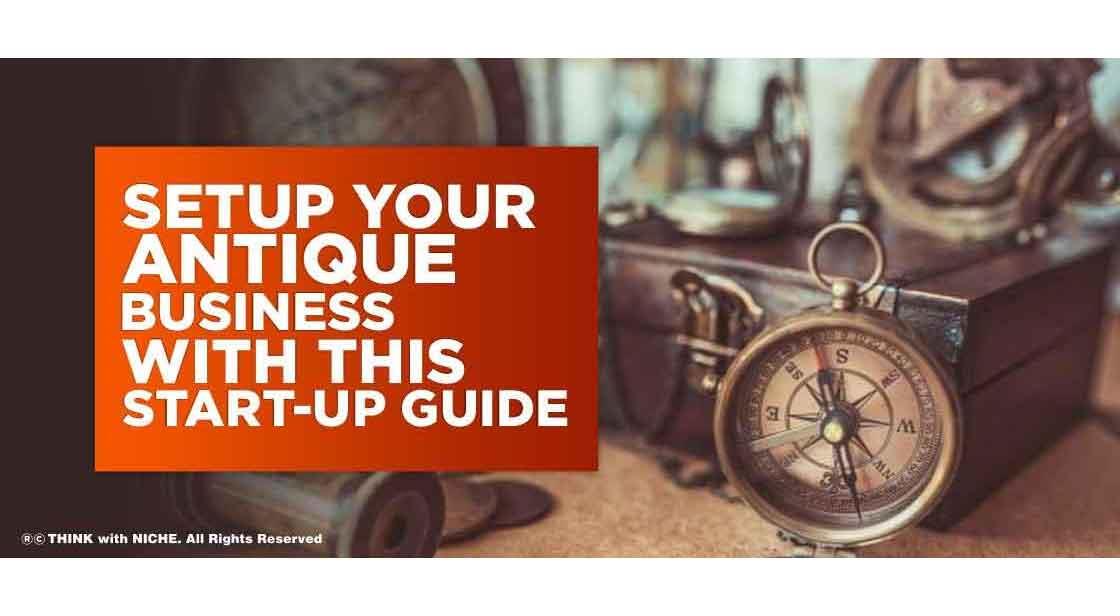Set Up Your Antique Business With This Start-Up Guide

Blog Post
For those who can relate to it, history is a space that is constantly enigmatic. History-related artifact collecting is a really passionate activity. In addition to museums and monuments, an authentic antique shop is one of the most fascinating destinations for such people.
If you want to try it, selling antiques is a good business. All you need to have is knowledge about the items you are selling and the eye to lock in a customer from whom you can earn. Antiques are amazing pieces of art and history that show us how diverse our culture is. It shows us from where our roots are attached, and we must make the coming generation learn about it. #ThinkWithNiche
You must be thinking that the antique business is very hard to set up. Let me tell you something, without any knowledge about the market and business, even a small food joint is very hard to handle. But you, my fellow readers, don’t have to worry about it at all. We have created some amazing articles related to the antique business. Being a soul in the technical world, one should remember their roots from the ancient world. You use smartphones because of basic inventions back in the old world. Bringing those old pieces of history into today’s world is what we call the antique business. In this article, you will get step-by-step guidance about how to set up your own antique business.
You can procure many antique items that have good market value. Before that, you need to be sure about the genre you want to start your business in. Confused about the genres in the antique business? Click Here to learn about the different antique items you can sell and specialize in a particular one. Let's define an antique first before we continue.
What qualifies as an Antique?
According to the traditional definition of antique, an item must be at least 100 years old and in its original state. (Motor vehicles are an exception to this rule; according to some definitions, an automobile can be considered an antique even if it is only 25 years old.)
Now let’s learn about how to set up your own antique business, and let’s dig some gold out of it.
Start-Up Guide To Building Your Own Antique Business
Without any further ado, we will talk straight away about the steps:
1. Selecting the Perfect Product Line
A wide variety of goods that can grab the attention of an art collector are available in antique shops, including furniture, home décor elements like mirrors, candle stands, and doorknobs, as well as works of art. These might steal the show in any living area. You can acquire large orders for home decor or an office project in addition to single consumers.
You may even recreate a well-known piece of the old art for your clients.
You must be aware of clients, use innovative marketing strategies, and have a thorough understanding of your products if you own an antique store. It will assist you in establishing a profitable antique business.
2. Business Planning/ Antique Store Planning
Before you start the business, you must be clear about your plan. Without a plan, there is no success and no story. Before being a business owner, be an entrepreneur. This attitude will help you in outlining the plan and mark the specifics
3. Location for your antique shop
Find a spacious, noticeable location for your antique shop. Large glass windows should be installed in the storefront to allow customers to readily view the antiques and collectibles. Important factors to take into account are enough customer parking space and simple street access. Customers frequently search for comparable goods when they are out shopping. Therefore, it makes sense to be close to businesses like furnishings, gourmet kitchen supplies, and bedding stores. It's because your clientele will have similar demographics to theirs.
When the shop's interior decoration is complete, you should get a sign maker to make the signs.
4. Analyze your competitors
Learn about other antique and collectible shops' product lineups by visiting them. Take note of their product mix, such as which centuries they are trading in. You should stock your store with products like rugs, home decor, antique furniture, showpieces, and wall hangings if you want to sell vintage décor.
Today, no business idea is completely original, therefore you should be aware of your competitors. Prior to choosing the service, you should be aware of the possibilities available to your customers. You must establish your competitive advantage after comprehending the competitive market condition.
Also Read: 8 Best Digital Fashion Marketplaces
5. Startup costs and ongoing costs
You need to consider the starting cost of your business. You will be purchasing or collecting many antique items for your store, which will cost you a fortune. So, before you get into it, be sure you have funds at your disposal when you need to procure items. This opening cost can be less if you have an online store. It will save you space and money on office construction. For a startup, your cost should be less. Talking about ongoing costs, this cost is relevant after your business has started. You will be buying and selling items, so your overall credit must have a good line. Be sure you have reliable transportation and an online store that can ease your ongoing costs.
6. Strengthen your knowledge of antique
You must be an expert on a specific set of antiques and collectibles if you own an antique shop. To find out the typical selling prices for goods, look through the most recent valuation guidelines and keep an eye on international auctions. Visit other dealers to get advice from their knowledgeable staff. If, for instance, you have a specialization in coins, you may pursue your interest while simultaneously building a profitable antique store that sells old coins.
7. Identify your market
Do you know who is your most valued customer? It is that one individual who appreciates your keen eye for unique items and of superior quality. Such a person will always come back to you whenever he wants to buy an antique item. Grab hold of such individuals and grow your market around them.
8. Charging your customers
How much you ask for an item depends on the item itself. The market will be there to help you price an item and sell it to a customer.
9. Making your business profitable
You must always be ready to sell those items that are lying on the shelf for too long. It will give you an upper hand in procuring more and more items and selling them at a faster pace.
10. Naming your business
What you name your business will affect how your customers see it. Be sure you have a name that can be easily connected to the things you sell. Get your catchy business name registered so that you don’t have to worry about copyright and other legal issues in the future.
11. Legal entity formation
Be sure that you establish your business as a legal entity. LLC (Limited liability Company) or a corporation. It will protect you when your antique store is raided and sued. You won’t be held personally liable if your business is LLC
Conclusion
These small steps can help you in setting a business that deals with the old-world pieces of evidence that fascinate everyone. People will love a space pen, but they will adore a feather pen that was used ages back. It is because history attracts us more than anything else, and you will deliver the historical pieces to the world through your antique business.
You May Like
EDITOR’S CHOICE












